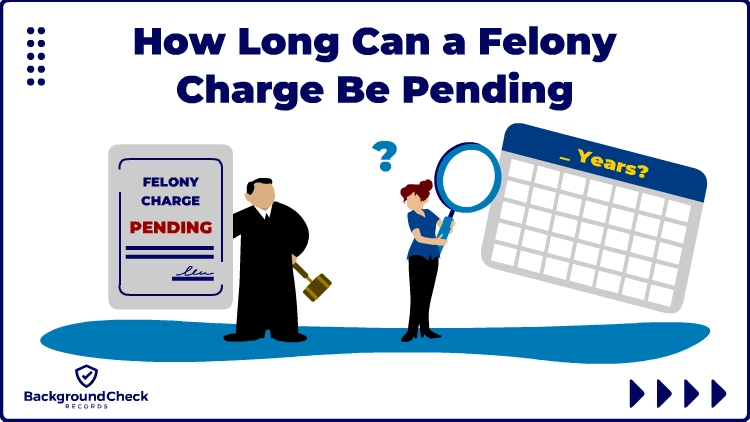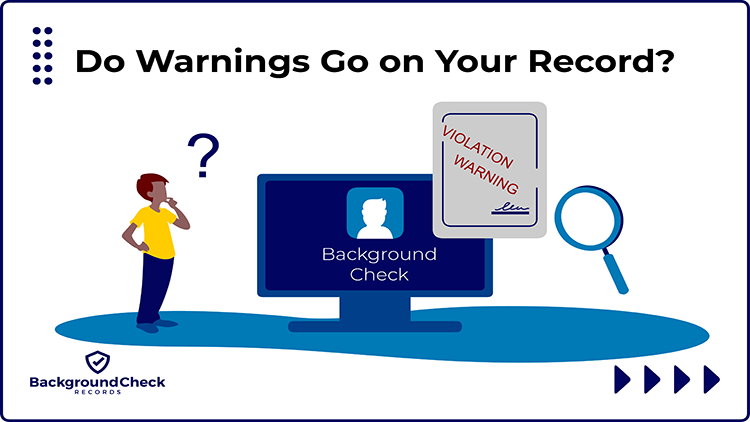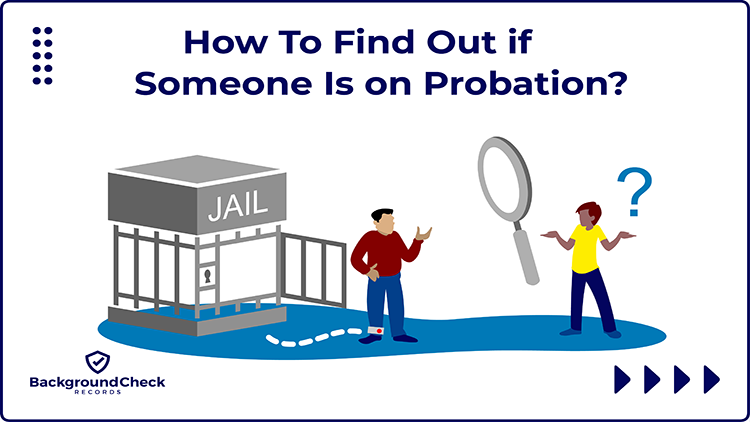How Long Can a Felony Charge Be Pending? Guide to Felony Charges
A felony charge can cause a great deal of damage to a person’s job prospects, housing and licensure, and understanding how long a felony charge can be pending can help individuals’ understand the general timeframe and process that goes along with felony prosecutions.
This free guide on felony charges gives individuals an idea of the duration a felony can remain pending in each state until it is prosecuted, dismissed or expunged, and how long a felony charge can stay on a record after formally being filed with the courts.
How Long a Felony Charge Can Be Pending in Every State
Because felony offenses can involve a lengthy investigation, grand jury deliberations and review by the district attorney’s office, the time from commission of the offense to formal charges can be weeks, months or sometimes years.
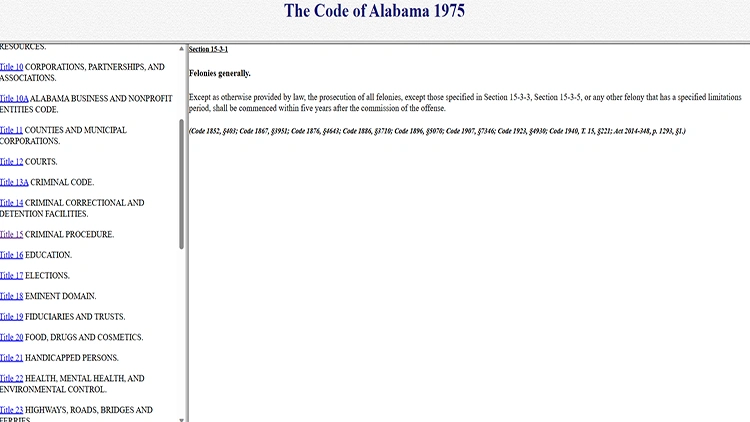
Source: The Code of Alabama1
The duration a felony may be pending is also dependent upon the laws in the state where the crime was committed.2
Each state has its own laws, rules, regulations or policies regarding how quickly a felony must be formally charged before it is dismissed. The table below outlines how long can a felony be pending in each state:
| How Long a Felony Can Remain Pending in Every State* |
Statute |
Brief Explanation |
| Alabama |
15-3-1 |
|
| Alaska |
12.10.010 |
|
| Arizona |
13-107 |
|
| Arkansas |
5-1-109 |
- Arson 10 years
- Class A, Y 6 years
- Class B, C, D 3 years
- Insurance Fraud 3 years
- Other fraud 1 year
- Felony by public servant 5-10 years
|
| California |
Penal Code 801 |
|
| Colorado |
16-5-401 |
|
| Connecticut |
54-193 |
|
| Delaware |
Title 11 |
- 5 years (increased to 10 if there is DNA evidence presented)
|
| Florida |
Chapter 775 |
|
| Georgia |
17-3-1, -2, -2.1, 2.2, -3 (2022) |
- Punishable by death or life in prison 7 years
- Crimes with child victims 7 years
- Other felonies 4 years
- Forcible rape 15 years
- Crimes against elderly 15 years
|
| Hawaii |
707-1 |
|
| Idaho |
19-402 |
|
| Illinois |
720 ICLS 5/3-5 |
|
| Indiana |
35-41-4-2 |
- For crimes involving children, charges must be formally filed before the victim reaches the age of 31
- Level 3-6 felonies 1 year
- Level 3 rape 5 years
- Most other felonies 2-5 years
|
| Iowa |
802.1-802.10 |
|
| Kansas |
21-5107 |
|
| Kentucky |
500.050 |
- No limitation for any felony
|
| Louisiana |
14:42 |
- 60 days if the person has been arrested, or 120 days if the charge can result in life without parole or death sentence
- 6 years for felonies where there was no arrest made
|
| Maine |
Title 17-1, Section 8 |
- A-C felonies 6 years
- A-C felonies involving gross sexual misconduct or unlawful sexual conduct 20 years
|
| Maryland |
5-106 |
- No limitation for any felony
|
| Massachusetts |
Chapter 277, Section 63 |
|
| Michigan |
767.24 |
|
| Minnesota |
628.26 |
|
| Mississippi |
99-1-5 |
|
| Missouri |
556.036 |
|
| Montana |
45-1.205 |
|
| Nebraska |
29-110 |
|
| New Hampshire |
625:8 |
|
| New Jersey |
2C:1-6 |
|
| New Mexico |
30-1-8 to 30-1-9.2 |
- 2nd degree felony 6 years
- 3rd and 4th degree felony 5 years
|
| New York |
Chapter 11-A,PtT 1, Ttl C, Art 30 |
|
| North Carolina |
Chapter 15, Section 1 |
- No limitations on any felony
|
| North Dakota |
29-04 |
|
| Ohio |
2901.13 |
|
| Oklahoma |
22-152 |
|
| Oregon |
131.125 |
|
| Pennsylvania |
Chapter 55, Title 42 |
|
| Rhode Island |
Chapter 41 |
|
| South Carolina |
Title 17 |
- No limitations on any felony
|
| South Dakota |
Title 22 |
|
| Tennessee |
40-2-101 |
- Class A 15 years
- Class B 8 years
- Class C and D 4 years
- Class E 2 years
|
| Texas |
Title 1, Chapter 12 |
|
| Utah |
Title 76, Chapter 1, Part 3 |
|
| Vermont |
Title 13, Chapter 151 |
|
| Virginia |
19.2-8 |
- No limitations on any felony
|
| Washington |
9A.04.080 |
|
| West Virginia |
Chapter 61 |
- No limitations on any felony
|
| Wisconsin |
939.74 |
|
| Wyoming |
Title 6 |
- No limitations on any felony
|
*Certain felonies do not have a statute of limitations and can be pending indefinitely. This table represents those felonies that must be filed within the listed time frame or they will be dismissed automatically.
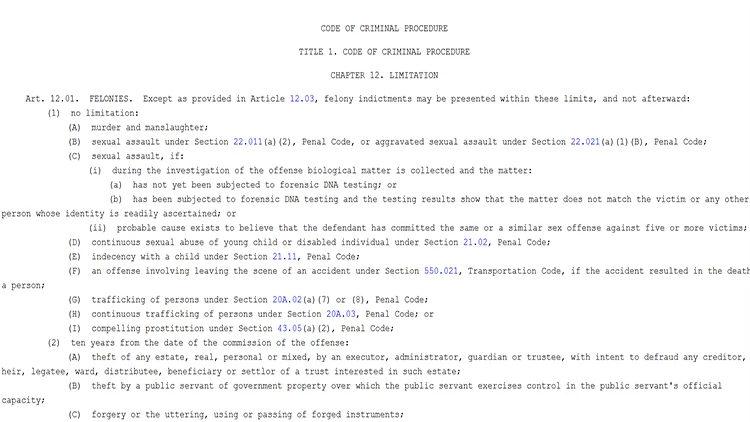
Source: The Texas Statutes3
The limitations listed above are for the majority of felony crimes in the state but here are some felonies that have no statute of limitations and which means they may be pending indefinitely due to the nature of the crimes.
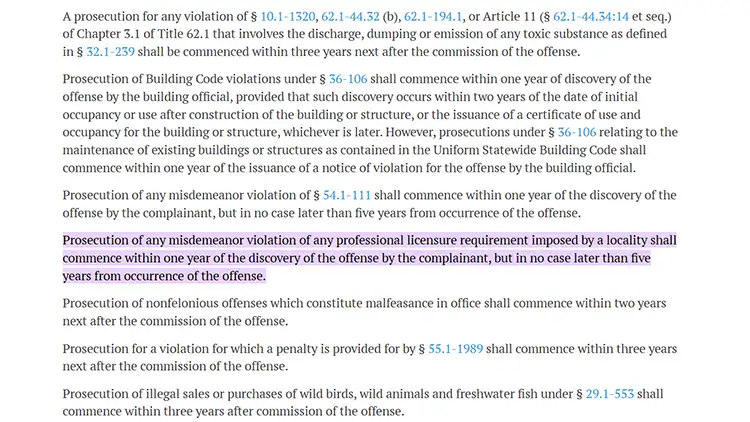
Source: The Virginia Law4
Types of Felonies Without a Statute of Limitations
There are some felonies that states consider so horrific that there is no limitation on how long these matters can be pending before they are either formally charged or dismissed.5
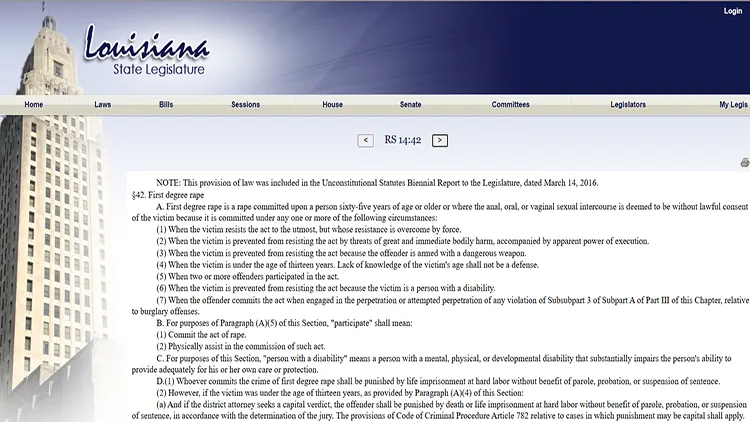
Source: The Louisiana Laws – Louisiana State Legislature6
The table below shows the matters in each state that have no limitations regarding the timeline a felony can remain pending:
Because of the particularly violent nature of the cases in the table above, law enforcement and prosecutors have much more leeway when it comes to presenting charges to the court.
What Is the Time Limit for the District Attorney or Prosecutor To File Charges?
Once a case has been presented to the district attorney by the investigator or law enforcement agency that responded to the initial report of a criminal violation, they must present the case to the grand jury within the prescribed statute of limitation outlined in the laws in that state.
Per the United States Constitution, no felony charges can be brought to court without a grand jury.7 As outlined in the tables in the previous sections, the prosecutor may have just a few years to seek formal charges (known as a true bill of indictment) through the grand jury process.
It is ultimately up to the grand jury whether or not a case will be placed on a docket for trial, and sometimes the DA (District Attorney) will seek a secret indictment.
Typically, individuals do not know they have a secret indictment until law enforcement arrests them. This raises the question of whether a person can be charged with a crime without knowing it.
As with secret indictments, a person may know they are suspected of committing a felony, but they are not aware grand jury proceedings have started against them until a true bill is issued and the person is taken into custody.
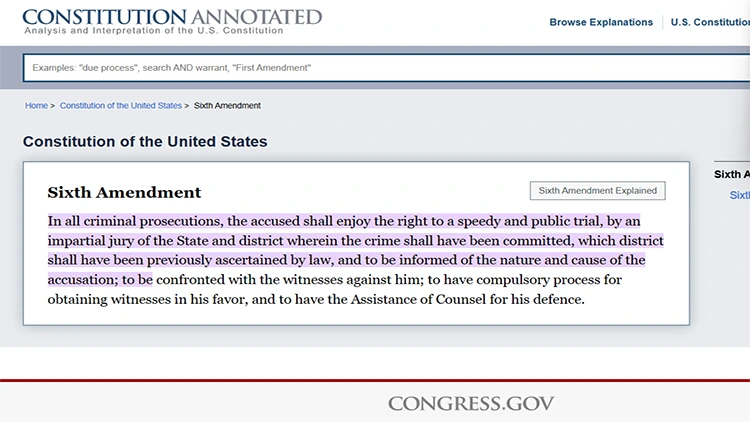
Source: The Constitution Annotated8
Hiring an attorney early in the process can help a person know how the case is progressing through the court system.
How Long Does It Usually Take To Set a Court Date for a Felony Case?
Another guarantee provided defendants by the United States Constitution is the Sixth Amendment right to a speedy trial.9 Because of this Constitutional right, most cases are set for trial within 30 to 60 days on average.
While this is the initial trial date, felony cases can take months to years to reach final disposition due to motions to continue the matter and other delays such as during the sentencing phase.
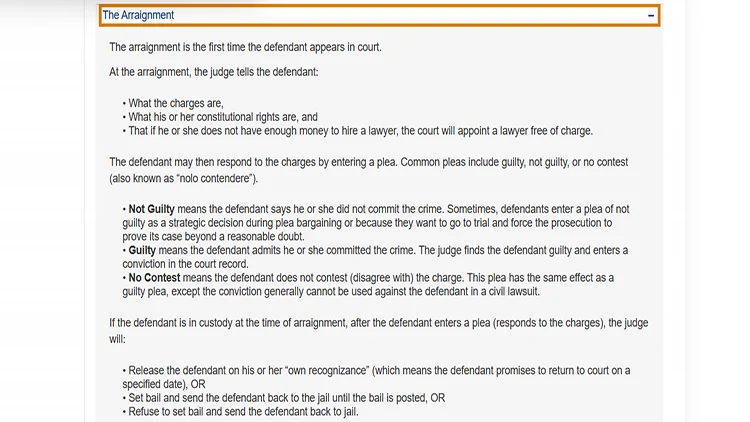
Source: The California Courts10
The time between indictment and court also includes the official arraignment which is where the judge formally reads the charges to the defendant at the first appearance, and the defendant enters a plea of guilty, not guilty or no contest.
Arraignments can happen as quickly as 24 hours after the grand jury hands down a true bill of indictment with an average time of 48 to 72 hours.11
Do Felonies Expire After Being Charged? (How Long Does a Felony Stay on Your Record?)
When thinking about the duration a felony stays on your record or whether it expires, in many states, a felony arrest or charge can remain on a person’s record indefinitely unless expunged by the state.
In other states, when an arrest or charge doesn’t move forward to a trial, or when the matter is dismissed by the district attorney, the matter may automatically be removed from the person’s record, or the defendant has the right to petition for an expungement of the non-conviction.
Pending charges can show up on a variety of background checks, including felonies, which can have a negative impact on a person’s ability to obtain employment.
The following states have automatic relief for felonies that do not move forward within the statute of limitations in that state making sure these charges do not negatively affect the subject of the search:
- Alaska
- California
- Connecticut
- Kentucky
- Maryland
- Massachusetts
- Michigan
- Nebraska
- New Hampshire
- New Jersey
- New York
- North Carolina
- Pennsylvania
- South Carolina
- Utah
- Vermont
- Virginia12
Like dismissed charges, dropped felonies can still appear on background checks unless prohibited by states that strictly restrict the release of non-conviction records to the public.
Overall, a felony case can take a long time from the commission of the crime to the final disposition in the matter.
Unless a felony charge is expunged or erased from the record, it will stay on it forever; however, Fair Credit Reporting Act rules for criminal non-convictions limit disclosure on a background check to seven years.13 To determine if criminal charges have been filed in a felony case, conducting a background check is one method, but not all background checks may indicate pending felonies.
Do Dismissed Felonies Show Up On a Background Check?
Even when dismissed, the felony charge itself can still appear on a background screening; however, the record will show the dismissal, not a conviction. Additionally, it depends on the type of background check that is run.
In a level 1 background check, employers primarily focus on convictions, but pending felonies might also surface and impact employment prospects. This type of screening may or may not display pending charges. Conversely, a level 2 background check is more likely to reveal pending felony charges as it includes fingerprinting, often conducted at the time of a felony arrest, and can reveal pending felonies nationwide.
For level 3 background checks, which involve fingerprinting and a thorough examination of a person’s background, they are more likely to uncover pending felonies. Therefore, having an attorney work towards dismissal is in the person’s best interest.
Lastly, a level 4 background check can take several months to complete, meaning a felony charge can progress from pending to trial or dismissal before the screening is finished. For instance, in Texas, felony charges must be filed by the prosecution within 90 days of an arrest.
If the charges aren’t filed, the matter will be dismissed and will show up on the level 4 screening as a dropped or dismissed charge.
Is It Possible for a Felony To Be Dropped or Dismissed?
If you’re wondering whether you will have a criminal record if charges are dismissed, note that while felony charges are considered the most serious offenses, strict rules of evidence must be followed, and district attorneys are particularly careful when prosecuting these crimes.
Therefore, when the DA does not think a case can be won, he or she can drop or dismiss the matter.
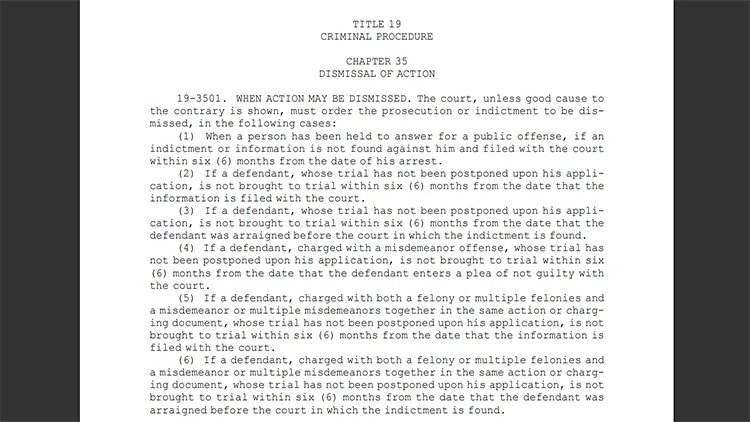
Source: The Idaho Legislature14
There is a distinction between dropped and dismissed, so it’s important to know this as a factor in knowing the duration a felony charge can remain pending since it impacts that part of the case directly.
A district attorney can drop a charge before seeking a grand jury indictment, and this occurs for a number of reasons which will be outlined later in the article. Dropped charges can be revisited at any time up to the amount of time allowed in the statute of limitations.
Dismissed charges usually occur after an indictment, and may or may not impact if the case can be reinstated. For example, when a felony is dismissed without prejudice, the district attorney has the option to bring the matter back to court at a later date.
When a case is dismissed with prejudice, that felony charge cannot be brought back to court for any reason; however, new charges arising from the incident can be presented to the grand jury providing the statute of limitations has not expired.15
Signs Your Case Will Be Dismissed or Dropped
District attorneys are elected officials, and since they rely on their record during campaign times, a DA weighs each case carefully to look for things that may result in an acquittal. Dropped or dismissed charges are how a DA controls the amount of trials in the jurisdiction as well as maintaining a high win-loss record. Dismissed charges do show up on a background check, but dismissed charges do not carry the same weight as convictions.
There are a number of signs a case may be dismissed or dropped, including the following:
- Insufficient proof the defendant is guilty: the first test will be whether there is sufficient evidence to get an indictment. If not, the DA will drop the matter and kick it back to law enforcement for further investigation. If the matter cannot even pass a grand jury, it will not pass the threshold of guilty beyond a reasonable doubt established for criminal cases.
- Witnesses aren’t available: if there are no witnesses, or witnesses will not come forward or are unwilling to testify, this weakens the DA’s case and can lead to dismissal or dropped charges.
- Evidence cannot be admitted: if evidence is gathered illegally or through unethical or dishonest means, it can severely taint the DA’s case leading dropped charges or a dismissal.
- Evidence goes missing: if evidence isn’t properly logged, goes missing, gets stolen or is accidentally (or intentionally) destroyed, the DA’s case is weakened and can be dismissed or dropped.
- Probable cause isn’t established: as stated earlier, if probable cause by the grand jury cannot be established, the trial will not occur until it can or the matter will be dropped or dismissed indefinitely.
- The criminal complaint is inaccurate or incomplete: an inaccurate or incomplete criminal complaint gives the defense attorney an opening to establish reasonable doubt in the mind of a judge or jury. The district attorney can drop or dismiss matters where the complaint has errors.
- Intent cannot be established: for crimes that require intent to commit them, when this cannot be established, the DA can drop or dismiss the charges.16
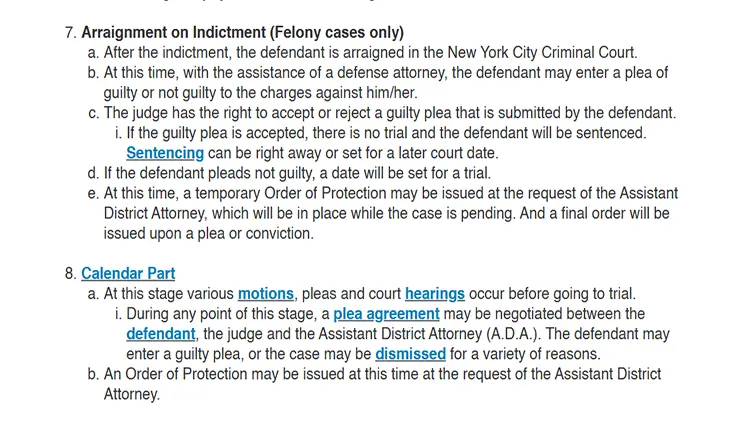
Source: NYC.gov17
A skilled defense attorney understands the process of getting charges dropped before a court date for felony charges, often by promptly identifying weaknesses in the district attorney’s case or petitioning the court for dismissal based on the passage of time between arrest and indictment.
Felony Legal Process and Timeline: From Investigation, To Indictment, To Appeal
As mentioned earlier, felony crimes are those that are considered especially horrible, and working a felony case from start to finish can take months or years depending on the nature of the crime. Since indictments can also be conducted in secret, individuals may wonder about their awareness of being charged with a crime, which depends on the stage of the felony process or if the District Attorney has pursued a secret indictment.
The table below shows the duration a felony charge can be pending, and what happens from start to finish in a felony case:
| Phase in a Felony Case |
Brief Explanation/Timeline |
| Investigation |
Sometimes the most time consuming part of the felony process, an investigation can take anywhere from weeks to years depending on the nature of the crime and the workload of the investigator working the case.18 |
| Charging |
Once the investigation has been presented to the District Attorney, they have until the statute of limitations expires to bring the matter to a grand jury. Sometimes a DA will have their own internal investigators conduct interviews with witnesses and review evidence before seeking an indictment. Again, this phase can take months. |
| Initial hearing/first appearance/arraignment |
This part of the hearing process takes place anywhere from 24 to 72 hours following the true bill of indictment by the grand jury. |
| Discovery |
Discovery is the process by which the defense is given a copy of any evidence or witness statements the DA has in a case. The defense files the motion for discovery, and can have up to 30 days from the date of the arraignment; however, most file these immediately following arraignment. The district attorney can have up to 30 to 45 days to respond. This phase can take a couple of months or more. Some states adopt a 10 day rule for discovery meaning that all evidence must be shared with the defense no later than 10 days before the trial starts.19 |
| Plea-bargaining |
The defense attorney will try to strike a deal in most cases since the DA rarely brings a case to trial that is not likely to result in a guilty verdict. This phase can take several weeks. |
| Preliminary hearings |
These hearings are held early in the court phase and can occur within a few months of the indictment being drafted. Preliminary hearings usually take less than a day to be heard.20 |
| Pre-trial motions |
One of the tools used by the defense is the pre-trial motions that can delay a case. Many of these will be motions to dismiss based on weak evidence, or other factors listed in the previous section. It is during this phase that the majority of dismissals occur. Pre-trial motions are also heard in less than a day in most cases. |
| Trial |
Trials typically occur months, and sometimes years, after a true bill of indictment has been handed down. At this phase, all the pre-trial motions have been settled, discovery has been completed, and plea-bargaining has fallen through. Some states require a trial begin within 1 to 2 months of the indictment; however, pretrial motions, preliminary hearings and motions to continue often delay trials for months.21 |
| Post-trial motions |
After the hearing, the defense can file post-trial motions for dismissal. These are usually heard within weeks following the trial, and at times can be heard on the same date as the verdict. |
| Sentencing |
When the matter results in a guilty plea or verdict, the sentencing phase is set sometimes immediately after the trial, but can be scheduled for a few weeks following the trial. |
| Appeal |
Appeals can take weeks, months or years to be fully resolved, depending on the nature of the case. For example, murder convictions (especially those that result in death penalty sentences) are guaranteed one automatic appeal to make sure everything in the case was done correctly. The defense will want to exhaust all appeals when a person is sentenced to prison or death for a felony conviction. |
Overall, felony cases from start to finish can take years to fully resolve. The statute of limitations starts when the crime is committed or discovered and sometimes certain phases of the process can bog down the process leading to a possible dismissal of the matter.
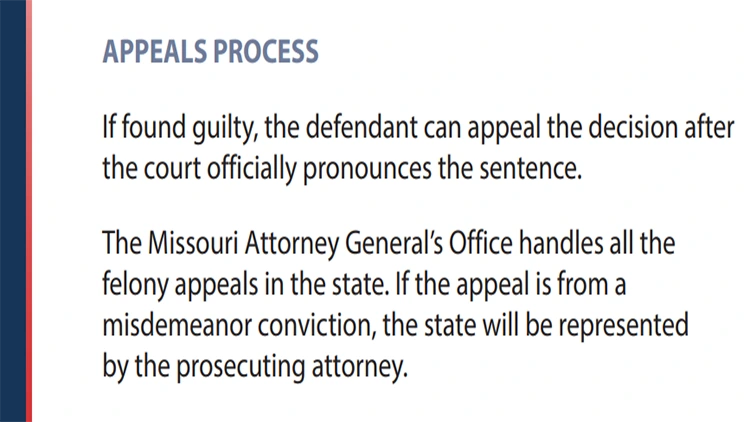
Source: The Missouri Attorney General22
The duration a felony charge can remain pending depends on a number of factors such as the type of felony, the state, and their statute of limitations. So when someone is facing a felony charge, this free guide provides details on the timeframe in which felony charges can be pending, and what the rules are in each state regarding felony statutes of limitations.
Frequently Asked Questions
How Long Before Indictment Takes Place?
Most felony cases can be presented to a grand jury at any time up to the expiration of the statute of limitations; however, in some cases they must be presented within 30 to 60 days such as when the individual has been arrested for a felony.
How Long Can an Assault Felony Case Remain Pending?
A number of factors go into play for assault cases. If it was a sexual assault, there may be no statue of limitations.
Felony assaults statutes of limitation are also determined by the state where the crime occurred. Some states require charges within a few years, others have no statute of limitation.
What Is the Statute of Limitations?
The statute of limitations is the amount of time between the commission of a crime (or discovery of a criminal offense occurring) and when charges must be filed. If charges are not filed within the prescribed statute of limitations, the defendant cannot be sanctioned for that offense.
1 Code Of Alabama. Accessed 28 April 2023. <http://alisondb.legislature.state.al.us/alison/codeofalabama/1975/coatoc.htm>
2 How long can a felony charge be pending? (n.d.). The Healthy Journal. Retrieved February 25, 2023, from <https://www.thehealthyjournal.com/faq/how-long-can-a-felony-charge-be-pending>
3 “CODE OF CRIMINAL PROCEDURE CHAPTER 12. LIMITATION.” Texas Statutes. Accessed 28 April 2023. <https://statutes.capitol.texas.gov/Docs/CR/htm/CR.12.htm>
4 “§ 19.2-8. Limitation of prosecutions.” Virginia Law. Accessed 28 April 2023. <https://law.lis.virginia.gov/vacode/title19.2/chapter1/section19.2-8/>
5 Mehta, V. (2023, January 3). Criminal Statutes of Limitations: Time Limits for State Charges. LawInfo. Retrieved February 25, 2023, from <https://www.lawinfo.com/resources/criminal-defense/criminal-statute-limitations-time-limits.html>
6 “Louisiana Laws.” Louisiana Laws – Louisiana State Legislature. Accessed 29 April 2023. <https://www.legis.la.gov/Legis/Law.aspx?d=78529>
7 Who Decides Whether Or Not I Will Be Charged With A Crime? (n.d.). Arnold & Smith, PLLC. Retrieved February 25, 2023, from <https://www.arnoldsmithlaw.com/who-decides-whether-or-not-i-will-be-charged-with-a-crime.html>
8 “U.S. Constitution – Sixth Amendment | Resources | Constitution Annotated | Congress.gov | Library of Congress.” Constitution Annotated. Accessed 29 April 2023. <https://constitution.congress.gov/constitution/amendment-6/>
9 Sixth Amendment | U.S. Constitution | US Law | LII / Legal Information Institute. (n.d.). Legal Information Institute. Retrieved February 25, 2023, from <https://www.law.cornell.edu/constitution/sixth_amendment>
10 “How Criminal Cases Work – criminal_selfhelp.” California Courts. Accessed 29 April 2023. <https://www.courts.ca.gov/1069.htm?rdeLocaleAttr=en>
11 How Long Does it Take for a Case to Go to Trial? (2021, May 28). Michael Fayard, Attorney at Law. Retrieved February 25, 2023, from <https://www.fayard-law.com/how-long-for-case-to-go-to-trial/>
12 50-State Comparison: Expungement, Sealing & Other Record Relief. (n.d.). Collateral Consequences Resource Center. Retrieved February 25, 2023, from <https://ccresourcecenter.org/state-restoration-profiles/50-state-comparisonjudicial-expungement-sealing-and-set-aside/>
13 Employer Background Checks and Your Rights | Consumer Advice. (n.d.). Federal Trade Commission. Retrieved February 25, 2023, from <https://consumer.ftc.gov/articles/employer-background-checks-your-rights>
14 “TITLE 19 CRIMINAL PROCEDURE CHAPTER 35 DISMISSAL OF ACTION 19-3501. WHEN ACTION MAY BE DISMISSED. The court, unless good cause t.” Idaho Legislature. Accessed 29 April 2023. <https://legislature.idaho.gov/wp-content/uploads/statutesrules/idstat/Title19/T19CH35.pdf>
15 Difference between dismissed with or without prejudice. (n.d.). Illinois Legal Aid Online. Retrieved February 25, 2023, from <https://www.illinoislegalaid.org/legal-information/difference-between-dismissed-or-without-prejudice>
16 Signs Prosecution’s Criminal Case is Weak & Should Be Dismissed. (n.d.). Esfandi Law Group. Retrieved February 25, 2023, from <https://esfandilawfirm.com/dismiss-weak-criminal-case/>
17 “Criminal Justice Process – NYPD.” NYC.gov. Accessed 29 April 2023. <https://www.nyc.gov/site/nypd/services/victim-services/criminal-justice-process.page>
18 California Criminal Case Process. (n.d.). Cron, Israels & Stark. Retrieved February 25, 2023, from <https://www.cronisraelsandstark.com/california-criminal-case-process>
19 What Does Discovery Actually Mean In A Criminal Case? (n.d.). Oklahoma City Criminal Defense Attorney. Retrieved February 25, 2023, from <https://www.singletondefense.com/criminal-defense/process/what-does-discovery-actually-mean-in-a-criminal-case/>
20 Bergman, P. (n.d.). The Difference Between a Preliminary Hearing and a Trial. Nolo. Retrieved February 25, 2023, from <https://www.nolo.com/legal-encyclopedia/the-difference-between-preliminary-hearing-trial.html>
21 Speedy Trial Act. (n.d.). Wikipedia. Retrieved February 25, 2023, from <https://en.wikipedia.org/wiki/Speedy_Trial_Act>
22 “The Court Process.” Missouri Attorney General. Accessed 29 April 2023. <https://ago.mo.gov/docs/default-source/publications/courtprocess.pdf?sfvrsn=4>

